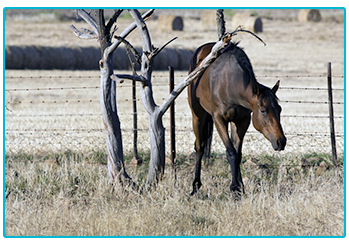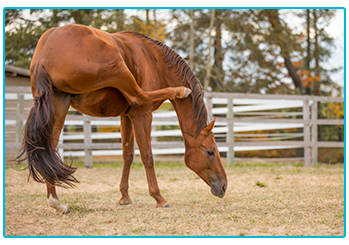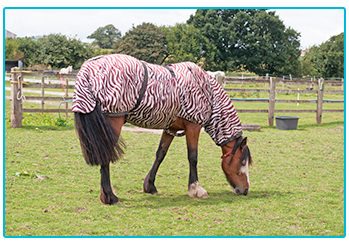Is your horse itching and rubbing inexplicably? Are you noticing bald patches, sores and swelling? Your horse could be suffering from one of a number of allergies, including sweet itch. At The Insurance Emporium, we’ve spoken to our horse health expert to ask them why your horse might be feeling itchy, and what you can do to help!

Itchy & Scratchy
Sweet itch, or insect bite hypersensitivity, is a recurrent and chronic problem which can leave your horse with puritic (itchy) skin. Most prevalent in the summer months, the skin problem can also occur throughout spring and autumn, and is caused by an allergic reaction to biting insects – particularly the Culicoides midge. Sweet itch is the most common allergic skin disease to affect horses worldwide, and is often found in sheltered fields with trees and hedges. Fields with static water sources can also be particularly vulnerable. The midges are most active at dawn or dusk, and when it is hot and humid.
Spotting the Signs
Symptoms of sweet itch can include itching and rubbing, usually to the mane, tail and head. The condition can also cause alopecia (bald patches) or urticaria (sores and swellings). In some cases, horses scratch themselves so intensely they cause sores on their skin, which can lead to secondary infections. If your horse is showing symptoms of sweet itch, contact your vet. They should examine your horse, and may recommend further investigation, including skin scrapings and allergy tests.

Treatment
Long term treatment and careful management are often needed for horses with sweet itch. Options include; topical antihistamines, topical steroids, medicated shampoos, supplements (such as nicotinamide), immunotherapy, medical treatment with steroids and antibiotics where necessary. There are also other creams and ointments which can be used, like Benzyl Benzoate. Remember to always discuss treatment options with your vet, so you can give your horse the solution that’s right for them.

Prevention
As the old saying goes, prevention is better than cure! There are a number of prevention methods to help you protect your horse from sweet itch, including; sweet itch rugs, hoods, masks, boots and sheath/udder protection. You should also try to reduce the number of midges in the area. Midge repellents and insecticides can be great to keep the critters away in the field. Fans can reduce midge activity in barns and stables, and machines are available that attract and kill midges. If you can, avoid fields with stagnant water, and also avoid fields which are sheltered by trees and hedges.
Other Allergies
Pollen allergies can also be problematic for horses in the summer. Your equine friend could be allergic to a number of types of pollen from a variety of sources, including trees, plants, grass and crops. You’ll want to look out for signs of pollen allergies in your horse, including runny and itchy eyes, runny nose, coughing, headshaking, lethargy and poor performance. To help manage pollen allergies, you could use a fly mask with an extended nose net, feed supplements such as garlic and avoid turn out on days when pollen count is high.
If you have any questions about sweet itch, or have noticed signs and symptoms of any allergies in your horse, make sure to ask your vet for advice. They should provide the best treatment and management options for any allergies and help you and your horse enjoy all of life’s adventures!
All content provided on this blog is for informational purposes only. We make no representations as to the accuracy or completeness of any information on this site or found by following any link on this site. We will not be liable for any errors or omissions in this information nor for the availability of this information. We will not be liable for any loss, injury or damage arising from the display or use of this information. This policy is subject to change at any time.


